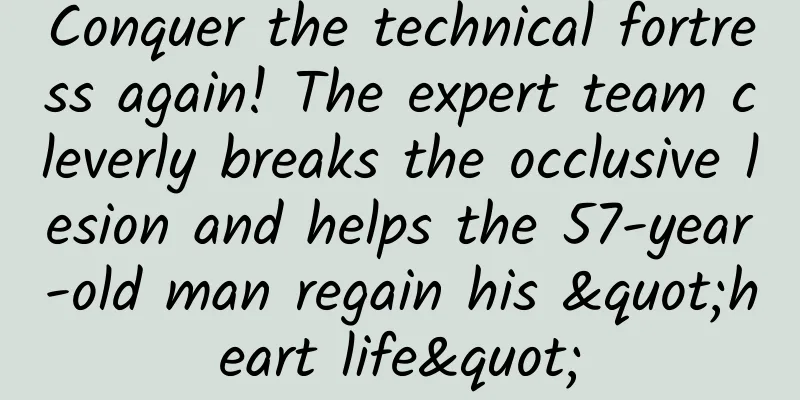Conquer the technical fortress again! The expert team cleverly breaks the occlusive lesion and helps the 57-year-old man regain his "heart life"

|
Recently, the cardiovascular intervention team of Qidong County People's Hospital successfully completed a coronary artery surgery for chronic total occlusion of the coronary artery. Mr. Chen, 57 years old this year, was admitted to the hospital due to "repeated chest tightness and shortness of breath for half a year, aggravated for 1 day". He was diagnosed with "acute heart failure and old anterior wall myocardial infarction" upon admission. After being admitted to the Department of Cardiovascular Medicine, he was given anti-heart failure treatment and coronary angiography after his condition stabilized, which showed: chronic occlusive lesion (CTO) in the middle segment of the anterior descending branch. Considering the complexity of the lesion and the safety factor of the operation, the cardiovascular intervention team developed a detailed surgical plan for Mr. Chen. After the family members agreed, Luo Xianxin, deputy chief physician, and Zhou Churen, attending physician, performed the operation. The forward approach was adopted, and if the forward approach failed, the reverse intervention technique was started because the patient had good right coronary collateral circulation. After more than two hours of effort, Mr. Chen's blocked anterior descending branch was finally opened, and his heart finally had sufficient blood. His symptoms of dyspnea were greatly improved, and he said he felt a lot more relaxed. Chief physician Peng Xiyi, director of the Department of Cardiovascular Medicine , introduced that the coronary artery occlusion time of CTO patients is relatively long, and is often accompanied by adverse factors such as vascular tortuosity and calcification, which makes treatment difficult and the surgical guidewire is difficult to pass smoothly. In addition, many occluded segments are long and there is no clear direction of subsequent vascular course, so the guidewire can easily pass through the vascular endothelium or even penetrate the blood vessel. Therefore, CTO lesions are difficult to operate in percutaneous coronary intervention, with a long operation time, low success rate, and a high incidence of surgical complications. The average success rate of CTO interventional treatment is about 60-70%, which is the biggest problem faced by coronary intervention and the most challenging part of interventional treatment technology. Therefore, CTO lesions are considered the "last bastion" of coronary interventional treatment. Chronic total coronary occlusion (CTO) refers to the complete occlusion of the coronary artery for more than 3 months. The most common symptoms of patients with this disease are chest tightness and angina pectoris. If it is not taken seriously and treated in time, it will lead to myocardial ischemia, insufficient blood supply to the whole body, heart failure and death. The Department of Cardiovascular Medicine of Qidong County People's Hospital is now able to routinely carry out interventional treatments for high-difficulty coronary artery occlusive lesions, and can better serve the majority of patients. Hunan Medical Chat Special Author: Kuang Dengfeng and Luo Xianxin from Qidong County People's Hospital Follow @湖南医聊 to get more health science information! (Edited by YT) |
<<: Keep healthy or recover from illness? Should we take the antioxidants in bottles and cans?
Recommend
Girls have pain on the left side of their stomach when they urinate
Going to the toilet is a normal metabolic process...
What to do if a pregnant woman can't sleep due to toothache
For pregnant women, symptoms such as toothache ar...
Agomelatine can treat depression and improve sleep. What should you pay attention to when using it?
Huazi had not been sleeping well recently, so he ...
Can I get pregnant with intrauterine adhesions?
In life, many female friends have some gynecologi...
How to treat menstrual headaches? These five points must be achieved
Women will experience headaches during menstruati...
What are the symptoms of atrophic vaginitis?
Atrophic vaginitis threatens the health of women....
3 symptoms of women before menopause
Before menopause, women often experience irregula...
What causes onychomycosis? How to prevent onychomycosis
Summer is the peak season for onychomycosis, and ...
Does cervical erosion affect fertility?
Cervical erosion is a relatively common female di...
Height 158cm and weight 100kg
Many girls try their best to lose weight in order...
Why won’t pumpkin cake rise? How to make golden pumpkin cake
Pumpkin cake is a kind of food made of pumpkin and...
How to prevent two-color breast hyperplasia?
Breast hyperplasia is a very common gynecological...
Pelvic inflammatory disease Fallopian tube adhesions
We all know that women have two fallopian tubes, ...
What should I do if my period hasn't come for three months?
Menstruation is a standard for judging whether a ...
Why is my period so light this month?
If a girl has a healthy diet and a regular life, ...









